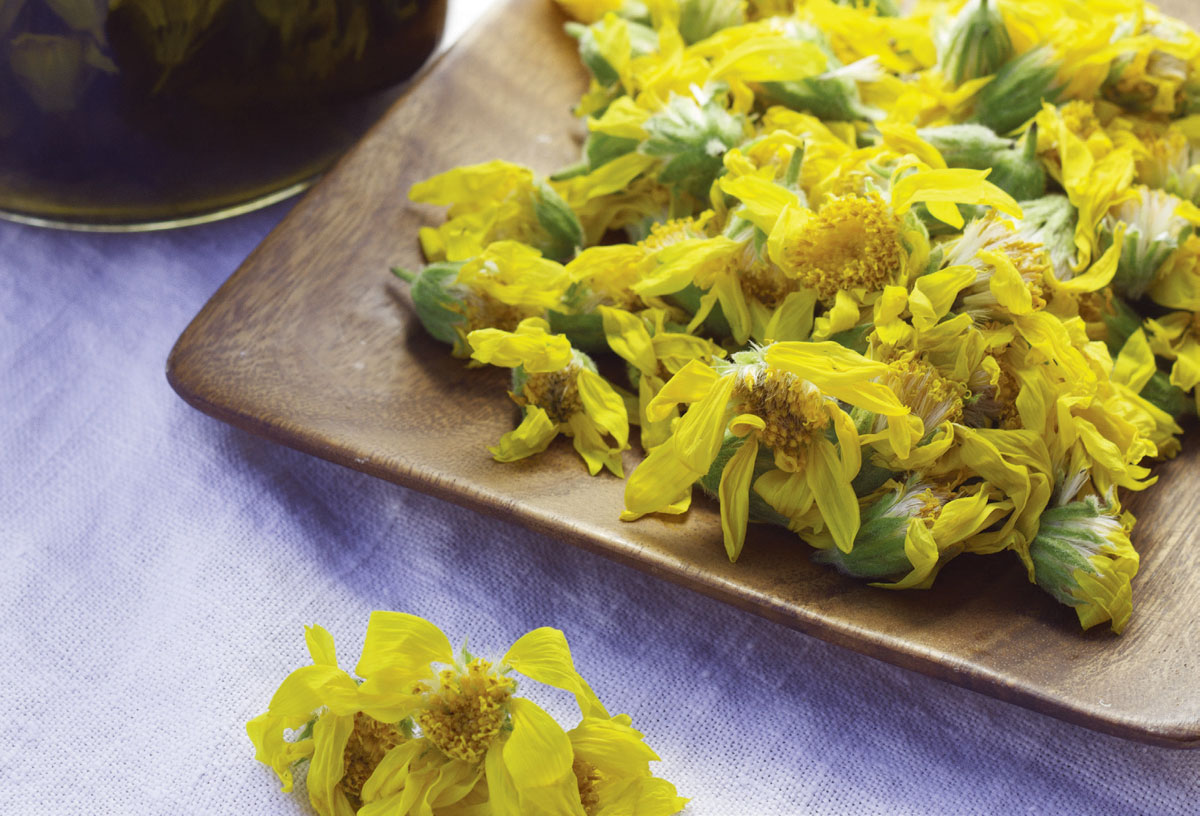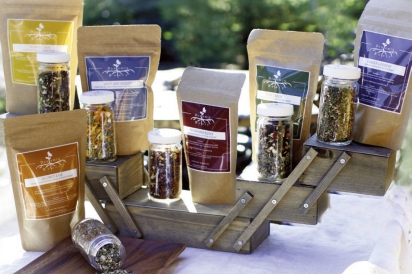Wildcraft at Dynamic Roots
Dynamic Roots introduces bioregional medicinals through Community Supported Herbalism
It is an afternoon in July, and I am walking through the Basalt Food Garden, in full bloom. I step over what appears to be a robust weed flourishing along a path. Stephanie Syson immediately squats down and begins examining the long, velvety leaves. Dawne Vrabel bends alongside her. There is a quick discussion of the plant’s identity: mullein. Stephanie masterfully lists facts, uses and inherent strengths of the plant I saw as a garden nuisance, needing to be pulled from the earth.
“A lot of medicinal herbs are called weeds,” says Syson, who with Vrabel and a third partner, Kate Miller, are the owners of Dynamic Roots, a medicinal herb company based in Carbondale. “These things are growing on their own, in these places like cracks on the sidewalks. They are strong and suited for survival. These plants are the healers of the earth, taking in those toxins in the soil. They heal that landscape. For medicine, these plants do the same thing: clean out the body.”
Dynamic Roots opened for business in 2013 when Vrabel was co-directing the Roaring Fork Food Policy Council and Syson was managing Central Rocky Mountain Permaculture Institute. Together, they began teaching herbalism and sustainability classes as well.
“As a part of our classes, after growing, we were teaching people to make medicine,” says Syson. “So many of the students liked to make [medicine] as projects, but didn’t have the time to make cough syrup when their kids were sick. They were asking, ‘Can you make it for us?’”
Miller, who lives in Nederland, joined the company last year after graduating from Colorado School of Clinical Herbalism in Boulder. Today Dynamic Roots offers high-altitude-grown and handcrafted herbal remedies, body care products and teas, which they sell through Community Supported Herbalism (CSH), akin to a food CSA, and retail product line.
While they share in the varied responsibilities of a growing company, the three women balance their strengths: Syson in growing, Vrabel with research and Miller with formulating. The trinity’s collective 30 years of experience and knowledge has helped Dynamic Roots establish a loyal following of customers.
New to the line are six teas, “useable medicine” that people can use every day, says Miller, who formulated each. While they are specifically crafted to help with issues such as allergies or women’s health, Miller recommends them for general immune support. “It took me four months to formulate all the ratios,” she says. “We want to make them end-user and kid friendly too. I drank a lot of tea to test them this year.”
The team works quickly to harvest the plants at the moment when they are most potent and effective. The vast majority of plants and roots used in their body care products and internals are sourced regionally. They also are dedicated to keeping their wild crops, harvested on private land, regenerating.
“We use the phrase ‘seed to skin,’” says Vrabel of their wildcrafted creams and salves. “We are gardeners and we practice taking medicinal herbs from growing the plant to finished product and then back to seed.”
For example, says Syson, osha root is a very valuable medicinal root and is rare in other bioregions. She is particularly careful when harvesting, taking only a small amount of every plant she finds, and encouraging growth by alternating years in which she harvests from those plants.
“We are very careful on the land from which we are harvesting herbs,” she says. “We are very picky about where we harvest and that the land and water there is pure and unimpacted by herbicides.”
In addition to osha, Syson is often on the hunt for arnica, yarrow, mallow and nettles, horsetail, red clover, wild rose petals and hips, hawthorn berries, Oregon grape root, aspen bark and raspberry leaf.
After the growing and harvesting of plants, Dynamic Roots creates seasonal CSH boxes which contain their finished products. Provided to CSH members four times a year, before each new season begins, the boxes are packed with five to six remedies which tackle common ailments of that season. Boxes contain a variety of salves, balms or body cream, syrups, herbal extracts and a bonus product, all with information on each product’s ingredients and how it can be used.
“They give you things that you didn’t think you needed, but you do,” says Karen Nance, a member. “The box hits right when your kids start coughing. On top of that you take into consideration the potency, it is small scale and they use fresh roots.”
“Our bioregional herbalism business naturally transfers to the CSH,” says Vrabel. “Western herbalism grew mostly from European and Native American remedies and philosophies and many traditional healing methods birthed from what was around them within reach, what was available at that time and in that place.”
This fall begins the second year of the Dynamic Roots CSH. The fall products will support bodies with a stress tincture or tea, to help with a resumed busy schedule and harvest times. As the body settles down and more energy is shifting into the earth for winter, warming teas and cough syrups will be added to the CSH to offer families practical applications they can use in that season at that time. Local CSH members can pick up their boxes at Sustainable Settings in Carbondale (where they are planting new biodynamic gardens), while distant members’ boxes are shipped to their door.
“Stephanie and I are both mothers and we are making and crafting for our families,” says Vrabel. “We are both mothers who grew into herbalists. Our ties to other families and the greater community are important and a vital part to what we do.”
While being trusted in the community is a large part of Dynamic Roots’ success, it is also the efficacy of products that has people returning season after season.
“Because we have this landscape that is high, dry and cold, it forces plants to be very potent and strong,” says Syson. “The solar energy it captures from the blazing sunshine means the soil is more difficult to grow and the plants have to tough it out a bit.”
“The essential oil and medicinal constituent contents are higher,” adds Vrabel.
“The general idea is that the natural defenses of the plant translate to the body. The stronger the plant, the stronger the remedy, the stronger the person,” says Syson.
GO FIND IT!
Dynamic Roots CSH registration available online. DynamicRoots.com
Syson also teaches independently of Dynamic Roots at the Basalt Library, Basalt Middle School, Colorado State University Extension as well as other organizations that request presentations on herbalism, permaculture, seed saving and sustainable agriculture methods.







